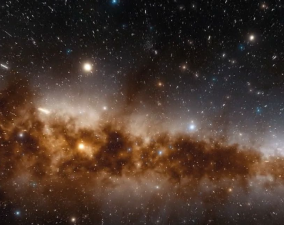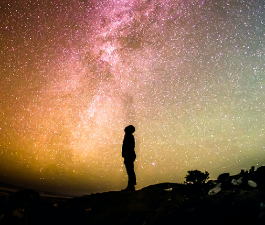Anyone trying to answer questions like “What is life?” and “Are we alone?” is inevitably limited by what we know: the only major type of life we know of or have studied so far exists only on Earth. But life on exoplanets may look and function differently than anything ever observed before, and to continue searching for life there, we need to acknowledge our tendency to be shortsighted.
Long ago, before the advent of DNA sequencing and other biotechnologies, we used to divide life into two categories: plants and animals. But we have since learned that the diversity of single-celled and multicellular organisms on this planet is astonishing. Despite this, all known life forms on Earth, including animals, plants, protists, fungi, archaea, and bacteria, share a common basic chemical structure: they are all built on a backbone of carbon atoms. It is understandable, therefore, that people assume that all organisms must be built this way—that all life is carbon-based, just like life forms in our world.
The birth of human civilization
Between 2 billion and 550 million years ago, two single cells with different genes began to fuse into a matching cell, and began to replicate and aggregate themselves, forming simple multicellular organisms, and biological differentiation began to form simple aquatic plants and animals. Perhaps the earth's sea, land and air were not suitable for biological survival during this period, and the evolution of life was dull and slow for 3.4 billion years. The second stage was the Big Bang period, between 560 million and 440 million years ago. This period is also known as the Cambrian Explosion of Life. During this period, a large number of organisms appeared, including trilobites, mollusks, shrimps, vertebrates, etc. In the following time, the creatures on Earth experienced five mass extinction periods, and humans were born after the fifth mass extinction. Humans evolved from primates. After the extinction of dinosaurs about 65 million years ago, mammals began to flourish, and primates also rose.
Theoretically, there should be alien civilizations everywhere in the universe, but in actual observations, the universe is very quiet, so many people began to doubt whether there is really only human civilization in the universe? Are the so-called alien civilizations actually human imaginations? Theoretically, this possibility exists, because there is no evidence that civilization is the next stage of life, that is, a planet that produces life does not necessarily produce intelligent civilization, nor does it necessarily develop technology to expand in the universe. In this way, it is normal that we have not discovered extraterrestrial civilization. There may be simple life on a planet, but there may not be intelligent life, because it is very difficult for ordinary life to evolve into intelligent life. Take the earth as an example. Life was born billions of years ago, but it took a long time to evolve from simple life to intelligent life such as humans. During this period, life has to undergo countless genetic mutations and natural selection. Most mutations are harmful or neutral, and only a very small number of beneficial mutations can be preserved. Gradually accumulating may promote intelligence.

Are there still habitable environments in the universe?
The earth is not the only planet in the universe with an environment for the existence of life, and the earth's materials are not independent of other earth-like planets. It can be said that the universe is isotropic. The physical characteristics or material chemical properties of the earth are not special (this can be proved by extraterrestrial meteorites). Then in the vast universe, there must be an ecosystem with a similar relationship between the solar system and the earth on a planet with more sand than on the earth.
In addition to basic biological instincts, humans on Earth have an ecological niche that goes beyond biological instincts (humankind as described by evolution), which gives humans an ideology that goes beyond instincts. This has become the most confusing issue for humans to self-examine since ancient times. Therefore, people created the ancestors of mankind in their subjective consciousness - gods and immortals. Regardless of the form of gods and immortals, they are the ancestors of mankind in both Eastern and Western cultures.


